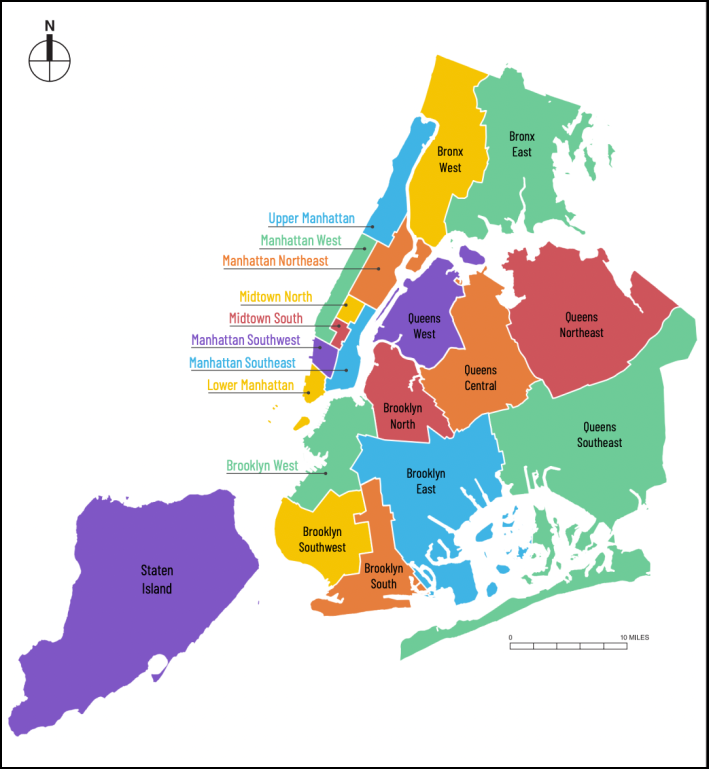Commercial waste haulers selected to collect trash under the city's Commercial Waste Zones program, including at least one with a deadly track record, will have to submit crash and driving data under a proposed amendment to the long-awaited reforms — information the city should have been considered before it awarded contracts, the plan's legislative architect told Streetsblog.
Action Carting is one of 18 companies officials chose to service 20 designated waste zones starting this September — despite the company's involvement in at least five traffic deaths, including that of 27-year-old cyclist Neftaly Ramirez in Greenpoint in 2017.
The Department of Sanitation published proposed amendments [PDF] to its waste zone rules on Monday, adding new requirements for carters to provide detailed crash information and "real time" driving data.
“Crash data from [commercial waste zone] awardees is good, but crash data from CWZ *applicants* would have been even better," Brooklyn Borough President Antonio Reynoso, who steered the passage of the commercial waste reforms behind the zoned program as a City Council member, said in a statement.
"Worker and street safety were a driving force of this bill, and they should have been a driving force behind the awardee selections."

Under the amendments proposed Monday, each company will have to file a report twice a year on crashes involving their truckers — including place and time of the incident, the driver’s name and license plate, how many injuries and fatalities there were, and a summary of what happened.
“The Commercial Waste Zones program has always been aimed at improving safety, both for people who work in the private carting industry and for the public at large,” said DSNY spokesman Joshua Goodman in a statement.
The reforms legislated by the City Council five years ago specifically targeted reductions in vehicle miles traveled and traffic violence wrought by the loosely-regulated sector. Reynoso's legislation aimed to better organize the "Wild West" conditions of the roughly 90 waste hauling companies barreling down neighborhood streets and killing residents, according to its backers, but it faced delays by the Adams administration.
The overhauls followed an exposé by ProPublica in 2018 detailing dangerous practices by Action Carting and the private waste sector in general, including overworking employees and reckless driving, after the industry racked up seven fatalities on the city's roads in a single year.
Action Carting did not respond to requests for comment by press time.
The proposed regulations require other driving records in “real time” via a telematics system, like vehicle miles traveled, speeding above the posted limits, and any hard stops, according to the May 6 notice.
Contractors will have notify the city "immediately" for any injuries, including crashes, involving their waste haulers, and submit crash reports every six months starting on Feb. 1.
The rules also make companies submit data on how much and what kinds of waste they collect, the rates they charge customers, agreements with subcontractors, investments in their fleet, staff training records, and any violations they get by local, state, or federal agencies.
The data could help the Department of Transportation redesign streets, advocates with Transportation Alternatives hoped.
"Requiring awardees of commercial waste zone contracts to provide comprehensive crash data would be a win for transparency, and it’s important this data not exist in a vacuum," said Elizabeth Adams, the group's Deputy Executive Director for Public Affairs.
"DSNY must use this crash data to inform contracts and hold carters accountable for dangerous driving — and we hope other agencies, including DOT, use it when redesigning streets for safety or drafting new truck routes."
In January, New York’s Strongest unveiled the first phase where the overhauls will begin — in Central Queens between Sept. 3 and Jan. 2. Critics slammed officials at a public hearing over the rules in March for providing no timeline for the remaining 19 zones or how they would measure its effectiveness.
Reynoso called on the city to ensure the new waste zones achieve the original goals of the 2019 law.
"If done right, CWZs can eliminate millions of truck miles traveled from our streets, keep workers and pedestrians safe, and ensure quality service for all customers," he said. "The City’s goal right now should be preventing bad implementation from undermining a good bill.”






